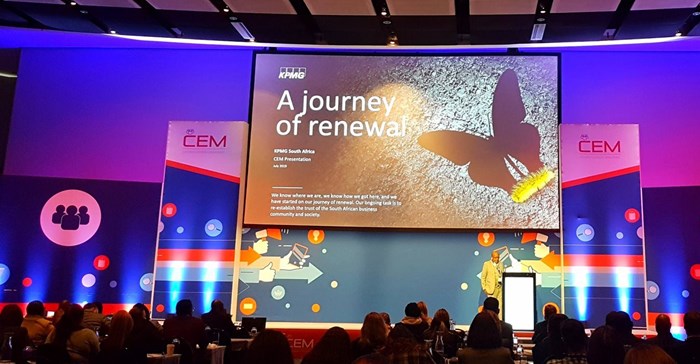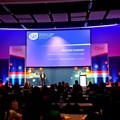#CEM19: Once you've lost consumers' trust, how do you re-establish it? KPMG responds

For the past century, the auditing industry was seen as the utmost in trustworthiness, but it has taken a recent knock - a hard one, at that.
KPMG SA, in particular, has weathered significant changes in the past 18 months, in managing the consequences of legacy engagements that caused serious reputational harm to the firm after it's alleged involvement in state capture.
But they're weathering the storm well. After a period of significant reflection and activity, KPMG SA has since implemented far-reaching changes as part of its journey to rebuild the public’s trust and restore growth.
The KPMG story - then and now
Sehoole explained how they're addressing both the past and the future in speaking about what exactly went wrong and where they hope to take the firm and profession going forward as a vital aspect of crisis communication and reputation management.
At the time of Sehoole's appointment as CEO of KPMG South Africa, it was reported:
His primary objective will be to restore public trust in the company. The audit firm has been embroiled in controversy since its links to Gupta-owned companies and a bogus report of a South African Revenue Service rogue unit were exposed last year. This lead to the en masse resignation of its senior management and a significant number of clients jumping ship.It's certainly a tough time but it's a profession Sehoole loves and believes in, and even in these trying situations, he still believes it can find its way back to normalcy, where the public expects them to be. As a result, his diary isn't scheduled the same as your average CEO, as he's dedicating lots of time addressing the wrongs of KPMG's past and how they're slowly getting back on track.
The headlines when the scandal broke were everywhere, says Sehoole, mainly criticising their links to Gupta-owned firms, but last straw for many was the Venda Building Society or VBS saga, dubbed "the most shocking example of bank fraud in South Africa’s history,” by financial analyst Stuart Theobald on the Classic Business Breakfast show, as countless ordinary people lost their life savings.
Sehoole says this all led to serious introspection at the firm as many external bodies wanted to know what went wrong. They went through significant reforms, as poor decisions had clearly been taken which showed a lack of ability to see beyond commercial interests and that of their clients.
Putting focus back on public interest, and what that really means
Sehoole says it's a privilege to do auditing work, but sometimes those doing the work lose sight of the fact that while auditing involves interacting with management and their information, in essence, you're not doing the audit for them but rather for the users of their financial statements - the investors, shareholders, public and communities in which they operate.
“Our customers are not the audited companies, but the shareholders and the users of the financial statements.” CEO of @KPMG_SA demonstrating humility as the firm realigned its understanding of its customer.
— Julia Ahlfeldt, CCXP (@JuliaAhlfeldt) July 31, 2019
Who is your customer? It might not be the one paying the bills.#cem19 pic.twitter.com/xDrYwJIxVN
Drilling down to individual level, Sehoole says that as a chartered accountant, the duty of public interest is of utmost importance, regardless of where in the corporate spectrum you sit. It applies to all.
Sehoole says that the resulting rigorous reforms in KPMG started with governance, in terms of structurally separating exco from the board, as well as appointing independent, non-executive directors for the first time to scrutinise the internal goings-on.
Former president of the South African Institute of Chartered Accountants (Saica) and chancellor of the University of Pretoria Wiseman Nkuhlu is now tightly steering the ship as executive chair.
Sehoole says they've also implemented several new committees chaired by independent, non-executive directors, to ensure all runnings are aboveboard, including a public interest committee, social and ethics committee, and risk and compliance committee.
For the first time, the firm has been opened to scrutiny from outside, with Nkuhlu stating in an open letter as published in Business Report in December that, "KPMG is a different company now," with nothing to hide' as it cooperates with the authorities.
Hotlines and internal 'speak up' policies
If you feel you have information that could help, KPMG has both an SA and international hotline to report on.
Sehoole adds that they've also reflected on their current client portfolio to match not just risk profile, but also whether they align with KPMG's values. A few companies have 'been exited' as a result, something that Sehoole admits they should have done much earlier.
They also have a new policy of running not just integrity checks but also lifestyle audits on employees, as well as their partners and children - Sehoole included, of course, because as he says, "If you don’t like it or say 'no', what are you hiding?"
This approach has come full-circle as before starting any new assignment, they again evaluate whether any information has come to light that would lead them to act in a different way. "We turned down two approaches last week as they didn't align with our values," says Sehoole.
"You're not going to build a trusted and professional organisation if you only ever focus on the bottom line." - Ignatius Sehoole, CEO of KPMG. A-flippin-MEN! #CEM19
— Nic Callegari (@ncallegari) July 31, 2019
They've also introduced an in-flight audit review for quality, in addition to the post-audit review so that issues don't get lost along the way. KPMG international loved this idea and is now implementing it globally, says Sehoole,
But the focus on quality is not just about the electronic audit itself. Where lapses are found, root cause analysis is conducted to ensure the same mistakes aren't repeated.
Sehoole says they're also running an internal project, compiling lessons learned to share with stakeholders and competitors alike, to help them avoid making the same mistakes and having engaged with Democracy Works, will be writing a detailed case study of what happened.
“We owe it to South Africa to get things right” says Ignatius Sehoole, CEO
— CEM Africa Summit (@CEMAfricaSummit) July 31, 2019
"It's encouraging to see the slow change in attitude, but we're by no means thinking we're done yet," says Sehoole.
KPMG's promise for the future: A culture of moral courage
Sehoole also spoke of where they hope to take KPMG SA in the future. He shared their vision to create a most trustworthy professional services firm, but feels it's not enough to just be trusted as they were trusted in the past and disappointed those that had trusted them. And so, they're strong on the position that a firm made up of teams of individuals - and the only way to be trusted is if those individuals and teams act in a trustworthy way, always.
We're not asking them to be schizophrenic, to only be trustworthy between the hours of 8am and 5pm. You either live it both in and outside the office, or KPMG is not for you. It’s a life journey. It’s the moral courage to do the right thing, even when nobody is looking.It's a shared promise to deliver quality engagements, while also being transparent, honest and holding each other accountable be transparent as basic tenets to rebuild the new KPMG.
After all, Sehoole says it's what happened never should have happened, but their culture is what allowed it to happen, so needed a culture refresh, a rebuild of sorts.
Wow. #KPMG’s CEO addresses ONLY the truth! Thank you for a great presentation. #CEM19 @AfricaMelane #Truth pic.twitter.com/eVJD8QAPGP
— CEM Africa Summit (@CEMAfricaSummit) July 31, 2019
Melane quotes former Western Cape premier Helen Zille who said to "never waste a good crisis".
Melane says it's time for not just KPMG but the industry as a whole to introspect on their purpose.
Sehoole says to be sceptical - don’t blindly believe what’s put in front of you. Verify, again and again, don’t get complacent.
Ethics, holding each other accountable
Melane shared that he doesn’t remember going through an ethics class in his own accounting training, many moons ago, to which Sehoole added that it's now included in the auditor training at both UJ and Wits.
He attended an ethics course at KPMG himself a few weeks ago but knows that a course at varsity and at KPMG is not enough. It helps to heighten awareness, but the best way of doing so is for leadership to not feel invincible.
They need to walk the talk and lead by example. Holding each other accountable will do more than all the courses in the world.
Lessons we can all learn from. Watch for my further coverage of the CEM Africa Summit.







































